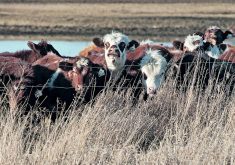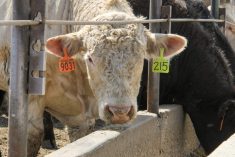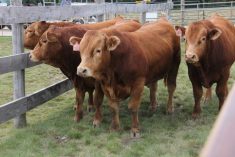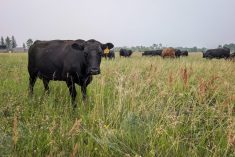Glacier FarmMedia—The Saskatchewan Cattlemen’s Association is emphasizing the importance of biosecurity and record keeping after a positive case of bovine tuberculosis was traced to a cattle herd in that province.
“Traceability is a huge part of resolving this situation quickly,” said chief executive officer Grant McLellan.
On Dec. 16, the Canadian Food Inspection Agency announced it was investigating a case of bovine TB identified on Nov. 29. The infected animal was slaughtered at an Alberta packer but was traced to a herd in Saskatchewan.
Read Also

Alberta harvest wrapping up: report
Harvest operations advanced to 96 per cent complete in Alberta as of Oct. 7, with only a few late-seeded cereal and canola fields remaining, according to the latest provincial crop report.
The herd is under quarantine until testing is complete.
“The protocols are in place. The animal was identified, and it didn’t enter the food chain,” said Alberta Beef Producers general manager Brad Dubeau.
McLellan said good record keeping and traceability are key to a smooth investigation. While beef cattle are traced via the Canadian Cattle Identification Agency’s RFID tag system, not every stop on an animal’s journey require tags to be scanned or records to be kept.
“Everything that a producer can do for the movement and the records management for their operation will just help in a situation, if someone finds themselves in a case like this,” McLellan said.
He emphasized the importance of biosecurity and traceability in case of an outbreak such as avian influenza that occurred this year among American dairy cattle.
“We want to get through that as quickly as possible and identify where that spread is happening so that we can mitigate the damages,” he added.
At press time, the CFIA had begun identifying all herds that may have had contact with the infected animal. It had also begun testing to identify the strain of bacteria, the agency said in a statement.
Identified herds are quarantined for testing and slaughtered if required.
Cases of bovine TB popped up in a Saskatchewan herd in 2023 and in a British Columbia herd in 2019. However, Canada’s TB management protocols are working well, Dubeau said.
“We are identifying these cases,” he said.
“We have a protocol. We’re ready to move forward and we’re able to navigate the situation as best we can.”
Added McLellan: “It’s a challenging disease to manage.”
He pointed to potential contact between infected wildlife and cattle. Infected cattle can also be asymptomatic.
McLellan said after the 2023 TB investigation, the SCA asked the CFIA to improve its communication processes so cattle groups and provincial officials could be informed as quickly as possible.
“We have a direct pipeline to our producers through our communication channels,” he said.
“It’s just useful, frankly, to keep those open lines of communication so that everyone has the same information.”
SCA has also advocated for improved compensation for affected producers. While producers are compensated for culled animals and costs associated with destruction and disposal, they don’t receive anything for disinfection costs. Even for smaller operations, this can run into the hundreds of thousands of dollars, McLellan said.
“Our position has been that CFIA should play a role not just in the containment and eradication of the disease, but they should help support the industry and that producer get back into production,” he said.
















